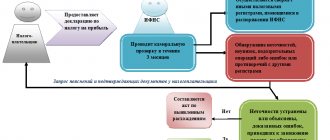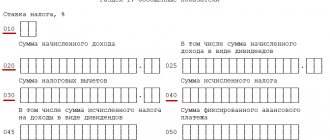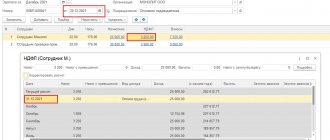What is VAT
VAT is an indirect tax that is paid on the sale of goods, services and property rights. Its payment occurs as follows.
- The factory orders linen to sew a batch of summer dresses. The fabric manufacturer issues an invoice including VAT.
- While seamstresses are making dresses, economists are calculating their cost. They look at how much money is spent on tailoring. The VAT paid for flax is also included in this list, but is recorded as a “tax credit”.
- The dresses are ready and sent to the company store. The calculation of the price tag includes the cost of the goods, the share of profit and the VAT itself.
- When the dresses are sold, the company counts the profit. 20% is deducted from the total amount. The buyer has already paid for them. Then the money goes to the Federal Tax Service.
From the whole situation it is clear that the entrepreneur pays the tax, but the buyer provides it.
Basic concepts of VAT
Object of VAT taxation:
- sale of goods, works, services on the territory of Russia, transfer of property rights (the right to claim debt, intellectual rights, lease rights, the right to permanent use of land, etc.), as well as gratuitous transfer of ownership of goods, results of work and provision of services;
- carrying out construction and installation work for own consumption;
- transfer for one’s own needs of goods, works, services, the costs of which are not taken into account when calculating income tax;
- import of goods into the territory of the Russian Federation.
VAT payers
are Russian organizations and individual entrepreneurs, as well as importers and exporters.
Tax rate VAT
can be equal to 0%, 10% and 20%. There are also “settlement rates” equal to 10/110 or 20/120. They are used for operations specified in paragraph 4 of Art. 164 of the Tax Code of the Russian Federation, for example, when receiving an advance payment for goods, work, services.
Tax base for VAT
in the general case, it consists of the cost of goods, works, and services sold, taking into account excise taxes for excisable goods.
Tax period for VAT
- quarter.
Input VAT
— tax paid to suppliers and subject to deduction.
Output VAT
- a tax received from consumers on the sale of goods and services.
Is this the right benefit?
Let us recall that the Code provides for operations that are exempt from VAT (clauses 1, 2, 3 of Article 149 of the Tax Code of the Russian Federation).
For example, such an operation as the provision by a lessor of premises for rent on the territory of Russia to foreign citizens or organizations accredited in our country is not subject to taxation. This rule applies in cases where the legislation of the relevant foreign state:
- a similar procedure has been established in relation to citizens of Russia and Russian organizations accredited in this foreign state;
- such a norm is provided for by an international treaty (agreement) of the Russian Federation (clause 1 of Article 149 of the Tax Code of the Russian Federation).
However, tax legislation does not establish whether the above transactions are tax benefits, the legality of application of which must be documented.
This situation is clarified by Resolution of the Plenum of the Supreme Arbitration Court of the Russian Federation dated May 30, 2014 No. 33 “On some issues that arise in arbitration courts when considering cases related to the collection of value added tax,” which recently came into force. It reflects that when conducting a desk audit, payers, at the request of the tax inspectorate, are required to submit documents confirming the right to tax benefits if they are used. But when applying this rule, the courts need to take into account such a concept as a “tax benefit.” Let us recall that, according to paragraph 1 of Article 56 of the Code, tax benefits are recognized as advantages provided to certain categories of taxpayers compared to other taxpayers. Consequently, the taxpayer needs to provide additional information and documents only for those transactions that, by their nature, meet the concept of a tax benefit.
On a note
In some cases, documents cannot be requested from taxpayers for transactions that are not subject to taxation or are exempt from VAT.
So, for example, subparagraph 5 of paragraph 2 of Article 149 of the Code establishes a tax benefit in relation to canteens in educational and medical organizations, subparagraph 1 of paragraph 3 of Article 149 - in relation to religious organizations, subparagraph 2 of paragraph 3 of Article 149 - in relation to public organizations of disabled people, subparagraph 14 paragraph 3 of Article 149 of the Code - in relation to bar associations, law bureaus and chambers of lawyers.
At the same time, in some cases, taxpayers cannot be required to provide documents on transactions that are not subject to taxation (clause 2 of Article 146 of the Tax Code of the Russian Federation) or are exempt from VAT (Article 149 of the Tax Code of the Russian Federation). For example, if such an exemption does not provide benefits to a certain category of persons, but represents special rules for taxation of relevant transactions.
Thus, the legality of requesting additional documents during a desk audit depends on whether the VAT exemption provided for in Article 149 of the Code is a tax benefit.
What is the tax percentage?
The Federal Tax Service applies three tax rates for VAT.
- 0% - applies in cases described in clause 1 of Article 164 of the Tax Code of the Russian Federation. The most common case is the export of goods.
- 10% — food products, goods for children, periodicals, books, medical goods are taxed.
- 20% is the basic VAT rate. Applies in all other cases.
It is important to note that not only goods can be subject to VAT. The tax is paid on imports, construction without a contract and transfer of services and goods for personal use.
The following are exempt from VAT:
- work of government bodies;
- purchase and privatization of municipal and state-owned enterprises;
- investment;
- sale of land plots;
- transfer of money to enterprises operating on a non-commercial basis.
Additional lists
According to the Ministry of Finance, in order to understand in detail which medical services are not subject to VAT, you can and should refer to the following by-laws:
- List of works (services) that constitute medical activities (Appendix to the Decree of the Government of the Russian Federation of April 16, 2012 No. 291 “On licensing of medical activities” (contains about 150 items);
- in general, the Regulations on licensing of medical activities;
- Requirements for the organization and performance of work (services) in the provision of primary health care, specialized (including high-tech), emergency (including specialized emergency), palliative medical care, provision of medical care during sanatorium-resort treatment, during medical examinations, medical examinations, medical examinations and sanitary and anti-epidemic (preventive) measures as part of the provision of medical care, during transplantation of organs and (or) tissues, circulation of donor blood and (or) its components for medical purposes (approved by order of the Ministry of Health dated March 11, 2013 No. 121n);
- The nomenclature of medical services is a systematic list of codes and names of medical services in healthcare (approved by order of the Ministry of Health dated October 13, 2017 No. 804n).
Also see “Instructions: how a medical worker can obtain the title “Veteran of Labor.”
How is VAT calculated?
You can find many VAT calculators on the Internet. But if you don’t trust algorithms, you can calculate the tax yourself.
VAT calculation
Let's continue the theme of dresses. The factory needs to purchase fabric for 150,000 rubles. To understand how much VAT is from this amount, we use a simple formula:
VAT=X*20/100
It turned out to be 30,000 rubles. But the question is different: is the tax included in these 150,000 rubles or does it have to be paid in excess. The difference is that in the first case the factory will purchase less fabric.
Calculation of the amount including VAT
To calculate the amount including VAT, use the following formula:
Xn = X+X*20/100
It turns out that in order to purchase fabrics worth 150,000 rubles “clean”, the factory will pay 180,000 rubles.
Calculation of the amount excluding VAT
If you need to find out what the amount of fabric purchased without VAT is, you need to apply the following formula:
X = Xn / 1.20
If a factory paid 150,000 rubles for fabric including VAT, then in fact they will bring 125,000 rubles worth of flax to the sewing shop.
Exemption of blood tests from VAT
The commented letter refers to services for diagnosis, prevention and treatment of the population exempt from VAT according to the List from the Decree of the Government of the Russian Federation dated February 20, 2001 No. 132. In this List, among those exempt from VAT are diagnostic services directly provided to the population on an outpatient basis - outpatient medical care, including pre-medical care.
Such services are deciphered in more detail in subparagraph 1 of paragraph 2 of the Requirements, approved by order of the Ministry of Health of Russia dated March 11, 2013 No. 121n. It says here that within the framework of primary pre-hospital health care in an outpatient setting, services are provided, including:
- laboratory work;
- laboratory diagnostics;
- nursing.
Moreover, the exemption of such services from VAT is valid only if the company has the appropriate license to conduct core activities.
How to reduce VAT
There are several legal ways to reduce VAT:
- tax deduction;
- reduced tax rates - 0 and 10%;
- exemption from VAT due to the use of a special regime;
- increasing the share of export sales;
- carrying out non-taxable transactions;
- inclusion of delivery in the cost of goods.
Other schemes may raise suspicion from the tax authorities.
Tax deduction for VAT
The company has the right to reduce the amount of VAT tax charged to it by suppliers. This is called a tax deduction. You can apply for it in the following cases:
- VAT was presented by suppliers for goods, works or services.
- The entrepreneur paid VAT to customs when importing goods from abroad.
- The tax was presented by the sellers of property rights.
An individual entrepreneur or a company claiming a deduction must document the fact of the transaction, the purchase of goods for transactions on which VAT is charged and the registration of goods. Then the transaction will not arouse suspicion from the tax authorities.
Documents for VAT deduction
In order to receive a deduction, you need to prepare a package of documents and send it to your VAT return electronically. The declaration must indicate input and output VAT and the amount of tax payable.
The package of documents includes:
- invoices from suppliers;
- primary documents from suppliers that confirm that the transaction took place - invoices, certificates of completed work, etc.;
- documents confirming the registration of goods, works or services - acceptance certificates, extracts from KUDiR.
Invoices from suppliers must be recorded in the purchase ledger, and invoices issued by yourself must be recorded in the sales ledger.
Then the tax office will check the transaction data. If they do not cause suspicion, nothing more needs to be done. If the inspector has questions, he will require supporting documents. Lack of documents may result in an on-site inspection.
Tax exemption
The legal procedure for exempting certain transactions from taxation consists in completely removing from the taxpayer certain tax obligations in relation to these transactions.
The decision on tax exemption is made by an authorized person - an employee of the tax authority. In this case, the initiator of this procedure must be the taxpayer, who submits a written application to the relevant tax organization.
In the application, he indicates the code of transactions that, in his opinion, should be exempt from the taxation procedure. Along with a written application, the taxpayer must submit all the necessary documents, the list of which is approved by current tax regulations.
These documents include: accounting data for a certain time period, extracts from the balance sheet and sales ledger, an extract from the journal of current expenses and income.
In this case, a representative of the tax authority has the right to request other documents confirming the legitimate right of the taxpayer to be exempt from taxation.
A decision on refusal can be issued by an authorized person if the taxpayer has not submitted the necessary documents, or if it turns out that the information contained in them is unreliable.
Author of the article
VAT benefits
There are two options for benefits when a company does not pay VAT - taxation at a 0% rate and tax exemption. The difference is that with a zero rate, you can engage in exports and international air transportation and claim input VAT as a deduction. This means that the taxpayer must still issue invoices, fill out and submit VAT returns. Those who are exempt from paying tax do not file a return and are not entitled to claim deductions.
Some individual entrepreneurs and companies are completely exempt from VAT, others - for certain transactions.
Not required to pay VAT:
- IP on UTII, simplified tax system and PSN;
- participants of the Skolkovo project;
- Individual entrepreneurs and companies are subject to any tax system if their revenue over the last three months is less than 2 million rubles. To obtain such an exemption, you will have to submit additional documents.
Companies on the Unified Agricultural Tax operate under special conditions. From 2022, they pay VAT if they earned more than the established amount in a year:
- 90 million rubles for 2022;
- 80 million rubles for 2022;
- 79 million rubles for 2022, etc.
To receive benefits for the Unified Agricultural Tax, you need to submit documents for exemption. Otherwise, you will have to pay VAT on any income.
Certain transactions are also exempt from VAT:
- cash loans;
- sale of medical goods and services;
- transportation of passengers;
- stock trading.
A complete list of transactions exempt from VAT is contained in Art. 149 of the Tax Code of the Russian Federation.
There is also a benefit for exempting sales from VAT for Russian IT companies. In order to take advantage of the benefit, developers must include their software in the register of Russian computer programs.
When benefits don't apply
When importing goods.
If an individual entrepreneur imports goods from abroad using a special regime, he will have to pay VAT.
If an invoice is issued with VAT.
Special regime officers can, at the client’s request, issue him an invoice including VAT. But then the individual entrepreneur will have to file a declaration at the end of the quarter and pay this tax to the budget.
Educational services
Sales are not subject to VAT (clause 14, clause 2, article 149 of the Tax Code of the Russian Federation) “...services in the field of education provided by non-profit educational organizations for the implementation of general education and (or) professional educational programs (main and (or) additional), professional training programs specified in the license, or the educational process, as well as additional educational services corresponding to the level and focus of educational programs specified in the license, with the exception of consulting services, as well as services for leasing premises.”
In other words, services in the field of education are exempt from VAT only when provided in areas of basic and additional education confirmed by a license.
Also, classes with minor children in clubs, sections, studios and the maintenance of children in preschool institutions are not taxed (clause 4, clause 2, article 149 of the Tax Code of the Russian Federation).
Please note: the benefit is provided only to non-profit educational organizations.
Services in the field of education provided by commercial firms, as well as individual entrepreneurs, are taxed.
If your company provides services in the field of education and is entitled to a benefit, then you must definitely apply it. You cannot refuse the benefit.



